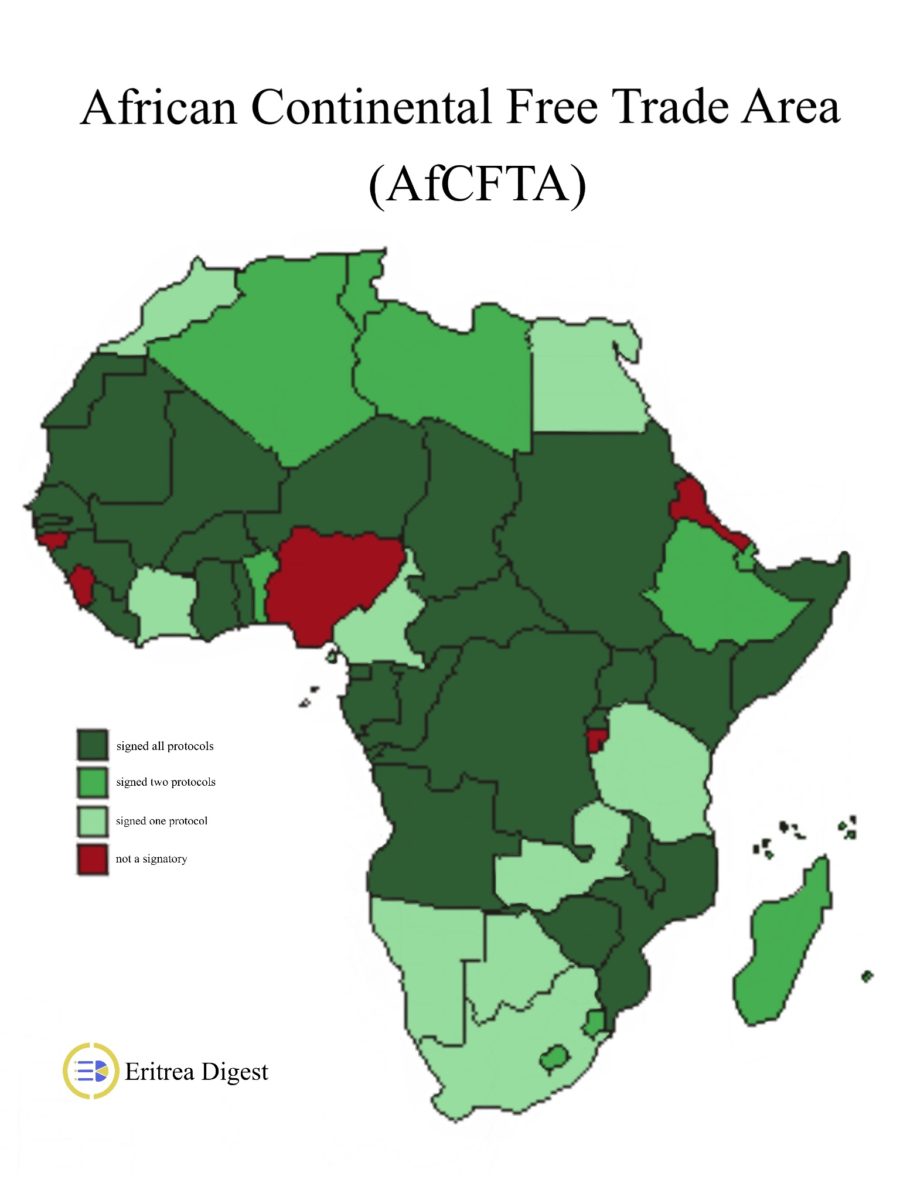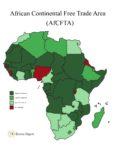Last Wednesday, March 21 ,2018, at the 10th extraordinary session of the African union, held at Rwanda’s capital Kigali, forty-seven (47) African countries signed their consent to make Africa continent a free-trade area (AfCFTA). This agreement, in the works for years, envisions a continent with free flow of people, goods and services. The instruments are the Kigali Declaration of 2003, the Free Movement Protocol (2017) and the Consolidated Text (2018.) Only five African countries did not sign any of the instruments: Burundi, Eritrea, Guinea-Bisau, Nigeria and Sierra Leone.
The agreement is hailed as historic for it signals a radical gesture that can potentially disrupt the structural dependency of Africa on its former colonial powers. It is anticipated that removing tariffs, which constitutes a core principle of the agreement, could increase intra-Africa trade by 52 percent by 2022 from the current 10 percent level. The agreement is considered a first stepping stone towards a European Union style free trade area that allows free movement of people and a single currency. In a time of nationalist backlash against the increasingly intense articulation of national economies to globalisation, the African Union initiative looks a bold move against the current. One should quickly concede that the AfCFTA agreement can and should be subjected to critical scrutiny. One can throw legitimate questions as to the potential of the agreement to sufficiently destablise the structural problems that have been arresting African development. One might also see the agreement as a neoliberal ado signifying nothing. Most likely, people are debating these issues in the countries which signed or refused to sign the agreement. The country where no such debate is conducted is Eritrea. In the absence of any official statement from the Eritrean government, we offer our conjectures.
Why?
In its long career, the ruling PFDJ party has made some extraordinarily sharp ideological and policy turns on ad hoc basis. Once, it was a darling of US hegemony “exhorting” the US to maintain its role in Africa (see here) and a willing volunteer in the nascent war on terror initiative, another time it waxes lyrical about the dangers of US hegemony and the destructive excesses of the war on terror. One time, it is all for constitutional governance with all the liberal trappings of free multi-party elections and free press, another time it withdraws to its Leninist vanguardist self preaching about how the masses are not yet mature to assume citizenry responsibilities.

The PFDJ swing to diametrically opposite extremes is also palpably clear on its economic policies. In one of its post-independence foundational economic policy document – the November 1994 Macro Policy document (attached here) – the PFDJ outlines a thorough neoliberal economic framework. The macroeconomic policy document states the establishment within two decades of “modern, technologically advanced and internationally competitive”, “knowledge and capital intensive”, and “export oriented” economy as the “overriding development objective” of the PFDJ government. The policy document envisages the achievement of this goal on the basis of unhindered external and internal private investment in “outward-oriented” manufacturing sector, irrigation based commercial agriculture, and the service sector. It envisions making Eritrea a hub of competitive international financial institutions, with “liberal internal and external trade regime” that enables the country to participate in “regional bilateral and multilateral trade and economic cooperation.”
What happened between then and now is, to use the hackneyed cliché, history. It is a common knowledge now that the PFDJ has made a sharp turn from its perhaps uncritical and wide-eyed embrace of glossy neoliberal economic agenda to an extremely autarkic black market dominated economy that inordinately banks its hope on a fledgling mining sector and mediocre irrigation projects. It is within this context that Eritrea’s absence in the AfCFTA agreement should be looked at. That said, one may still ask why the PFDJ has made the sharp turn in its economic outlook and shun major regional economic cooperation schemes. Did it experience a Road to Damascus moment, a kind of ideological epiphany that opened its eyes to the evil of neoliberal economy and compel it to delink/disarticulate the Eritrean economy from the vagaries of global Capital as suggested by heterodox economists like Samir Amin?
As much as one might want to exercise the principle of charity and give the PFDJ the benefit of ideological doubt as to the rationale for its shift in its economic policies, considering the spasmodic manner in which such policy shifts happen – usually according to the whims of its head Isaias Afewerki and without public and institutional debates – one should look elsewhere for an answer. One reason why the PFDJ is for a nationally sequestered economy is basically because it provides sinews to its power. As the current Chief of Staff General Filipos Weldeyohannes unequivocally stated in a meeting he conducted with government employees, who were forced for military training and dam construction at Gergera, in June 2015, the developmental and security goal of the government is to “control the population like the fingers of one’s hand.” The economy for the PFDJ is a site of governmentality. It is viscerally opposed to any ‘free’ economic regional schemes for it is afraid that that might destablise its propaganda projection of Eritrea as hortus conclusus where it wants to fixate Eritreans in juvenile celebration of mediocre projects such as this (video interview*)
Meanwhile, the PFDJ is intensifying what it has perfected so well – disappearing and jailing people en masse. After rounding up close to one thousand people during the funeral of Hajji Mussa, it has sent underage children to one of the notorious prison centres in Ala and the rest to Hashferay and Metkelabyot. It is ratcheting up its Islamic terror fear-mongering, talking about an unknown ‘radical’ preacher called Mohammed Jumma allegedly supported by Qatar and Sudan. The scene it is staging is reminiscent of 1993/94: Islam, Sudan, Jihad, Terror accompanied by massive disappearance and incarceration of Muslim Eritreans.
* See comments section for a summary of the surreal interview.


Leave A Reply